Building Trust: Exceptional Leadership In An Uncertain World With Darryl Stickel Ph.D
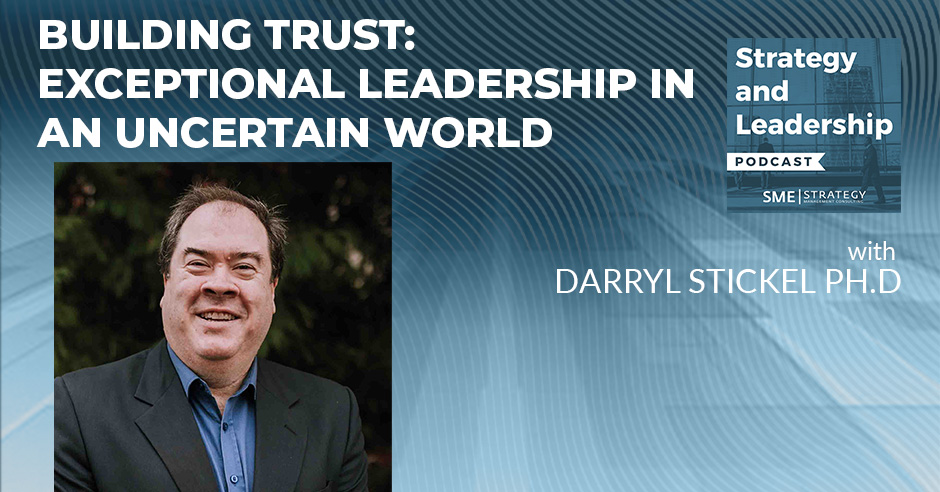
Trust is the glue that keeps society together, and without it, it motivates non-cooperation to people. Trust is as fragile as glass. If it shatters, it will always be harder to build it back. Today, Darryl Stickel, the Founder of Trust Unlimited, brings us into the framework of Building Trust effectively with other people through the ten levers. Darryl suggests showing vulnerability creates a space for others to trust you. His approach closes the gap between leaders and others. Let’s build back our society and combat the unprecedented trust-deficit crisis today.
Listen on Spotify: https://open.spotify.com/episode/3z46q8O5LQpj7NozS8adQL?si=e5a1c80b18cc4cd9
Listen on Apple Podcasts: https://podcasts.apple.com/ca/podcast/building-trust-exceptional-leadership-in-an/id1202449526?i=1000629184759
---
Watch the episode here
Looking for support with your strategic plan? Learn more about our strategic planning services
Listen to the podcast here
Building Trust: Exceptional Leadership In An Uncertain World With Darryl Stickel Ph.D
My guest is Darryl Stickel, PhD. He did his PhD building trust in hostile environments at Duke University. He is in British Columbia, which if you didn't know, that's where my home is. Darryl, I'm so excited to speak to you. Thanks for being here.
It is such a pleasure to be hanging out with you and your readers. Let's see if we can share some information with them.
Let's do it. Why don't you tell our readers a little bit about you, and your background and we'll get into our chat.
I was born and raised in Fort St. John, Northeastern British Columbia, moved to Victoria, did an Undergraduate degree in Psychology and a Master's degree in Public Administration. I was working in native land claims for the federal government. They would ask me deep philosophical questions like, “What is self-government? What will the province look like 50 years after claims are settled?” The last question they asked me was, “How do we convince a group of people who have been shafted for over 100 years that they should trust us?” I thought, “That is a good question.” I went to Duke and wrote my Doctoral thesis on building trust in hostile environments.
One of the things, for our readers, is if you don't understand the complexity of the relationship between First Nations in Canada and BC in light of events a couple of years ago, the group that has been shafted traditionally and it continues now. Interesting is not the right word, but paradigm. As somebody in BC, we either talk about truth and reconciliation and all that. It's neat to hear, but the idea of conflict is international. The work that you've done has taken you into a lot of different groups. I don't know where I want to ask you first. I want to ask you what you have touched on. What did you learn in your Doctoral research? We'll then maybe get into some application pieces.
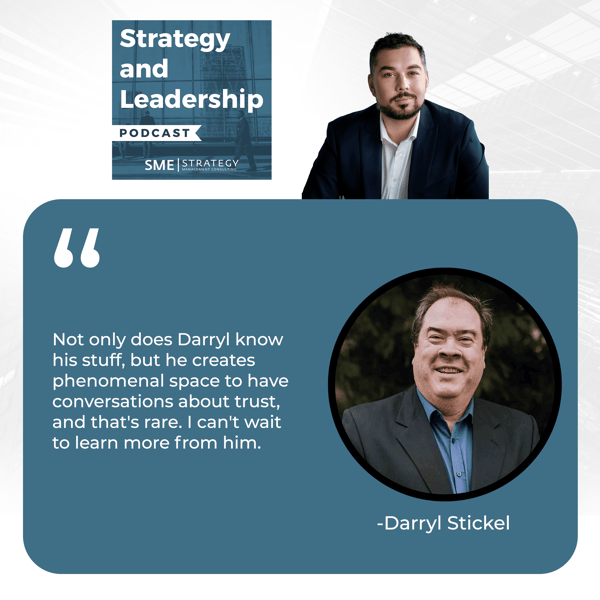
I started to realize that a lot of the work on trust was focused on certainty. For me, the definition of trust is a willingness to make yourself vulnerable when you can't completely predict how someone else is going to behave. In the definition, there are elements of uncertainty and vulnerability. If we start to break down where trust comes from, it comes from these underlying assumptions or perceptions about how uncertain I am and how vulnerable to what I feel.
There are gaps in the literature. When we decided to trust someone, we asked ourselves two fundamental questions. The first is, “How likely am I to be harmed?” which is perceived uncertainty. The second question is, “If I'm harmed, how bad is it going to hurt?” which is perceived vulnerability. Those things multiply together to give us a level of perceived risk. We each have a threshold of risk that we can tolerate.
If our perception that risk goes beyond the threshold, we don't trust. If it's beneath it, then we do. Building trust becomes fairly simple. It’s, “Where does uncertainty come from? How do I take steps to reduce it? Where does the vulnerability come from? How do I take steps to help the other person manage that? What is the leverage that I can use to make people more comfortable deciding to trust me?”
There are a few places that I went off to be in the path of that conversation. Uncertainty comes from us as individuals and from the context that we're embedded in. Most of the research hadn't talked about context at all. It didn't do a good job of explaining why we trust some people without knowing anything about them. You go to a doctor's office, you get in a cab, you get on an airplane, and you believe the pilots made it through all twelve steps of that substance abuse program. Virtually, none of it talked about vulnerability, which meant that we treated trust like a dichotomous variable. It was either present or absent, like an old-time light switch. The light was either on or off.
The reality is, we trust some people more than others. We couldn't talk about the depth of the relationship unless we started talking about vulnerability. Those are two places that I differed from the existing literature. After we've made that trust decision, there's a proceed outcome. We interpret the world through stories. We evaluate the outcome based on whether it was good or bad for us, and who gets the credit and who gets the point?
Again, there are a couple of levers in there that we can pull to make people more comfortable trusting us the next time we engage with each other. In the middle of all this is our emotional state whether we like or dislike somebody else. Ninety-nine percent of the trust research treats people like rational actors. I don't know if you've met people before, but we're not always rational. The more extreme our emotional states become, the less rational we are.
People are not always rational. The more extreme our emotional states become, the less rational we are.
In a lot of these long-term disputes, we see people trying to take these cognitive rational approaches to building trust when it's a deeply emotional issue. The model that I had gave me a framework to understand trust more effectively. To start applying concepts to be more proactive because a lot of people are talking about trust, but they're not talking about what to do about it. It gave me levers that I could pull. There are ten levers we can use to build trust effectively with other people.
We all have the ability to build trust. Some are better than others. Those who aren't very good have a lever that they pull you. Usually, it's the ability lever, these kinds of credentials, this background, and this much experience. Those who are better have multiple levers. Those who are good have multiple levers and they know when to pull which one. I went to work for McKinsey and Company after I finished my doctorate.
They said, “You’ve got a client's hands. Let's send you the worst place possible.” Now, I'm on the ground getting a chance to apply these concepts getting to practice these skills. Over the years of helping organizations and individuals better understand what trust is, how it works, and how to build it, it's been like a nonstop learning lab.
I've helped companies from all over the world figure out how to build stronger relationships either within their company or between them and their clients. I've worked with families trying to help them build stronger relationships with their kids. I've worked with couples trying to figure out how to build stronger relationships with one another. I've applied the model all over the world to a broad range of topics and I've learned a lot doing that.
I can't imagine what that's like. I'm looking forward to getting the book personally. One of the things that stuck with me is the idea of people being rational and if everything was a computation, then you could say, “Let's get below this level, everything would be fine.” There's the corporate conflict that you assume everybody has the best intentions. You can work within that paradigm and call it relatively simple.
You have a high-conflict situation like you did work with the Canadian military. We talked about the relationship between First Nations and all of that where it’s already tense but then what if it's less obvious? Do those levers still help you where maybe there's no perceived or no obvious conflict but the conflict is below or maybe people are saying one thing and not acting in line with that? You're not getting that clear information. How does one manage conflict when the terrain is less certain?
Your trust access is a social lubricant, and we see that our trust levels allow us to have conversations we otherwise wouldn't. A lot of times, one of the struggles we have with trust is that there's a low lack of self-awareness. When I ask people, “Who do you trust?” they'll give me close tight personal relationships, siblings, spouse, and parents, which is in line with that dichotomous variable notion. I either trust somebody or I don't. When I flip that question and say, “Who trusts you?” You get this long pause and people are like, “How would I know? How do I know if somebody trusts me or not?”
Trust access is a social lubricant, and our trust levels allow us to converse.
The answer is we know if people trust us. Let's go back to the definition as to willingness to be vulnerable when we could choose to do otherwise and when we can't completely predict someone else's behavior. The question becomes, “How can people make themselves vulnerable to me, and do they? If I'm a leader, do my people give me real development needs? Do they come to me with bad news or am I the last to know? Do they push back against things they don't think are going to work? Do they take risks are try new things, knowing that they might fail?” These are all the ways that they can make themselves vulnerable.
Do they ask for help? One of the challenges that I'm seeing in the world now is trust levels are about the lowest we've ever seen. It's because our vulnerability certainly hasn't gone down. If we think about that model, our uncertainties bounce all over the place. We see pandemics, race relations, international conflict, issues between genders, and changes in norms and values.
All of these things are causing us a profound amount of uncertainty. It's harder to be willing and more vulnerable. That's the challenge we face. That's the challenge that the leaders that are reading now face. If you want your people to trust you, they need to be vulnerable to you and it's harder now than it's ever been. Do you know what that means? You’ve got to have the guts to go first.
One of the ways we build trust is by leading with our imperfections. By being willing to be a little bit vulnerable first, to show them that it's okay to make mistakes, that we don't have all the answers and we're not perfect. It creates an environment where they feel like, “If the boss is able to make mistakes, then so am I.”
One of the lines that I give to the people that I coach is, “What made me a good leader ten years ago is not the same thing that would make me a good leader now. If I want to be a great leader three years from now, I'm going to have to learn, grow, develop, and try new things. I will stumble. I may fall. My expectation is that when I do, you're going to be there with me, supporting me and helping me learn from those experiences because that's what I'm going to be doing for you.”
Before speaking with you, I interviewed the CEO of a multibillion-dollar business, Andy Lansing. What I would take away is the parallel and one of the first things he said was, “I don't know everything. I hire people smarter than me and I provide a space for me to be humbled.” I don't know if that’s the term he used. Those are the words that I come up with, like, “A humble nature so that you're creating a space for two parties to be in if there's no space to occupy you in my space. I can't do anything for you if I haven't created space.”
Throughout our conversation, you mentioned race relations. Again, looking at African-American community in the US and their relationship with police, why is that? Is it that police are insufficiently trained? Is it that they don't have an opportunity to be humble or to have that self-awareness or/and likely is that there's such high uncertainty that they are using A) Their heuristic and B) That level of uncertainty in their job, which is by no means, easier?
I'm not throwing them under the bus in that regard, but the military situation and police situation, you have the highest degree of uncertainty. There's very little trust because your relationship is established because somebody did something to break trust. They're likely not going to be that. I find that so interesting of the big societal problems, race, and structures. I'm sure you covered that or touched on that or at least pontificating on that. What are your thoughts as that relates to it?
I've written an article about rebuilding trust with the police officer and a couple of articles on that topic. Naheed Nenshi, the former Mayor of Calgary, sent me a note saying, “This was so profoundly timely for my police force.” If we think about that model of uncertainty times vulnerability, the police aren't vulnerable for themselves. They're vulnerable to their partners and the rest of the community. Their level of vulnerability has escalated dramatically.
They can't tolerate much uncertainty at all. They're in places where they have to make quick decisions with limited information. There's a real challenging environment there. The challenge for those who are being overseen by the police is that within the US, there are so many different policing bodies. They all have different rules and regulations and all have different training methods. There's profound uncertainty, even within how you're going to be treated by one group versus another.
Uncertainty on both sides, even not just uncertainty.
It’s a hard situation. There are a lot of these big hairy problems that require collective collaborative action for us to solve and trust levels are the lowest we've ever seen. It's a challenge that I'm trying to combat because I've seen people and for your audience, most of them are leaders. The more senior we become, the less direct control we have over our outcomes, and the more dependent we are on those we lead for every bit of success that we aspire to.
Our ability to build trust with them becomes one of the critical differentiators between those who are merely competent and those who are exceptional. It's a skill we can all build. The things that we used to do to build trust are no longer sufficient. We need to be more intentional. We need to be more informed. That's why I wrote my book, Building Trust: Exceptional Leadership in an Uncertain World.
I wanted to try to share the approach that I take that's worked for people that I've worked with to understand that there are ten different levers that they can pull, to be more informed about pulling some of these different levers, so they can take control and become better leaders, get better output from their employees, higher levels of employee engagement, higher returns to shareholders, higher customer satisfaction, and higher loyalty. All of those things come from higher trust levels.
I was thinking of all of the use cases. Because we have a short amount of time, we won't be able to solve the world's problems on this show. One of them is the relationship with women in the corporate world and in that relationship, how much trust and certainty could be rebuilt, and a position of power and the whole thing. The one I want to focus on out of personal interest is societal benefit.
One of the people that I've worked with for a few years is the Department of Education in Alaska. The work we’re doing is around teaching kids how to read and get literacy up. What I find interesting about the parallels between Alaska and British Columbia is that you have a lot of First Nations and indigenous communities whose language was stripped of them as you know. Now, we're forcing we.
They’re in a context where learning English is the standard of learning and it's perpetuating trauma that has happened over a long time but is also truly done to help them be successful. I call it the modern society. How do you balance that line of trying to help somebody? It's a complicated thing because the original trauma that happened was under the guise of trying to help them but how do you build those relationships? It is bilateral, “I respect and see your view, what you're trying to accomplish, and what you want. I have my own thing that I'm trying to accomplish. How can we truly work together so that we have mutual benefit to warrant our respective shared outcomes?”
Part of the challenge is around the issue of benevolence. There are three levers we can pull as individuals. I said uncertainty comes from us as individuals and it comes from the context that we're embedded in. Often, we don't have profound control over the context but we do have some control over our own individual behaviors.
The three levers for the individual perspective are 1) Benevolence, the belief that you've got my best interests at heart, 2) Integrity, do I follow through on my commitments and my actions line up with my values? and 3) Ability, do I have the skills to do what I say I'm going to do? When I stand in front of parents and ask them, “Who here has their kid's best interests at heart?” all the hands go up. When I flip that question and say, “How many of your kids would say that?” I get about a third.
If it's not obvious in a place where it's supposed to be obvious, then how do we make it obvious as a leader or as an educator trying to help someone who's struggling? How do we make it obvious that we have their best interests at heart? I'll tell you the story. There are a couple of stories that I have. One is with my son who decided he wanted to get a baseball scholarship, go to the US, and try to be a baseball player.
I said, “To do that, you have to eat well, exercise a lot, and do well in school to get the scholarship opportunity. You have to be well-liked by your coaches. You have to be a good teammate. There are all these attributes that have to show up for you to get a baseball scholarship.” He said, “Okay.” I started to nudge him about those things as we were going along, but because I'd included him in the conversation, it felt like I was on his side rather than on his back.
A big part of this is being able to signal clearly that we understand what the best interests of the other party are. Include them in that conversation rather than making an assumption. This is something your readers can practice. They can sit with one of their colleagues or direct reports and they can talk about this concept of benevolence. They could say, “I heard this guy Darryl. He was talking about benevolence. He said that it's about having someone's best interest at home. I think I do that, but it doesn't always seem to land that way. Have you ever experienced that?”
The other person is going to go, “Yes.” They get curious about that and dig into it a little bit where they tried to be benevolent that didn't work and then we narrow the funnel. We say, “Has someone ever had your back? Has it ever felt like someone was on your side?” That should provoke another response of, “I can think of a time when someone was looking out for me.” Whether it was a teacher, a colleague, or whatever it was.
Again, we dig in, “What did they do? What did that look like? How did it feel?” Now, we're getting hints about what benevolence looks like for them. We know the funnel even further. We say, “What does success look like for you? How do I help you get there? What would it look like if I was benevolent to you?” Now, we've included them in the conversation. We've created an opportunity for transparency because we can then refer back to that goal that they had and how we're trying to help them get there. It becomes a situation of us moving alongside them rather than standing over them.
I have two sons, Thomas and Alexander. They mean more to me than anything. What I think about their best interest, I think about it today, tomorrow, next week, next month, next year, or ten years down the road. I don't hold myself to that standard. I don't do things now that are going to help me ten years from now. What they're thinking about is right now. I have to earn the right to talk about the future. I have to try to help them be successful at the moment for them to have the feeling that I'm on their side and to have that story or narrative so that when I say or do things, they feel like I'm acting on their behalf.
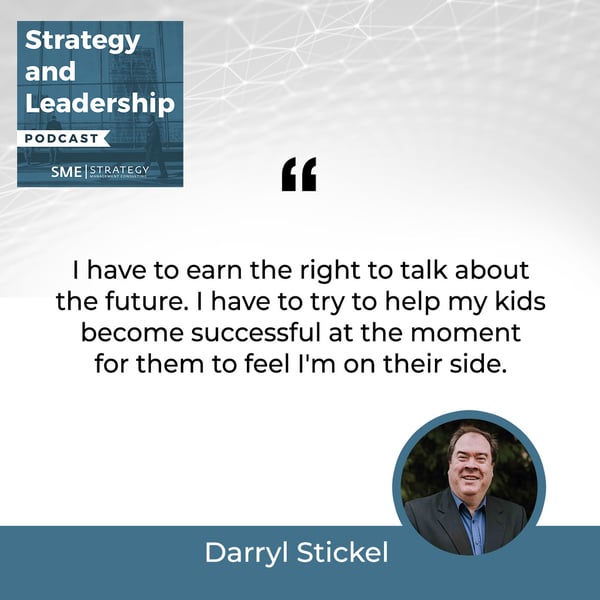
I'm taken aback because I'm impacted by what you said. The leaders that we talked to, that I sit with, that you sit with, even family and friends, I'm going to call it the energy required and the heart that's required to either get what we want, to help people the way that people want to help people, you’ve got to be there, do the work, and have integrity, as you had said. There's work that has to be put in. It's absolutely possible.
The reflective question that I would have for our audience and anyone reading is, “Are you ready to do what's needed to make it happen?” If you pull the levers, you understand what the levers are, it's just, “Are you going to do what it takes?” If you want to get a baseball scholarship, are you going to do what it takes? If you want to be a great parent to your kids, are you going to do what it takes? Do you want to drive societal community change policy reform? Are you willing to do what it takes to make it happen and to stand beside the people that you are looking to support and be about it versus talking about it?
Darryl, I wish we could talk longer. This, as you knew, would go fast and be cool. Before we sign off, I'm going to ask you how people can get ahold of you. To my audience, I talked to a lot of people, and if there's one person I would say, “Get this guy in your boardroom. Get this guy in front of your organization,” I’d never do that. I’d never say it, and I’m not even the kind of person who says they don't say it and then actually does say it.
Darryl, I'm so excited to pick up your book. I will get this in as many hands of the people. It's the building blocks to create a better society, better community, and better everything that we're looking for as long as we do the work and don't just talk a bunch. Where can people connect with you? Where can they learn more about your book? Where can they book you to speak? Where can they connect with you as a human being?
I'm happy to help. My objective is to make the world a better place. If people want to come alongside, I would welcome that. Darryl@TrustUnlimited.com and my website is TrustUnlimited.com. They'll find articles there. There's a link to the book. There's a masterclass that's connected in there in the Courses section. I'm happy to be helpful.
You've been more than helpful. I appreciate it and looking at what it's going to take to move forward, the most critical life initiatives like climate change, environmental responsibility, race, and all the stuff. It's not unsolvable. It requires humility, space, self-awareness, and all of that. Darryl, thank you again for being on the show and for chatting with me. It's been such a pleasure.
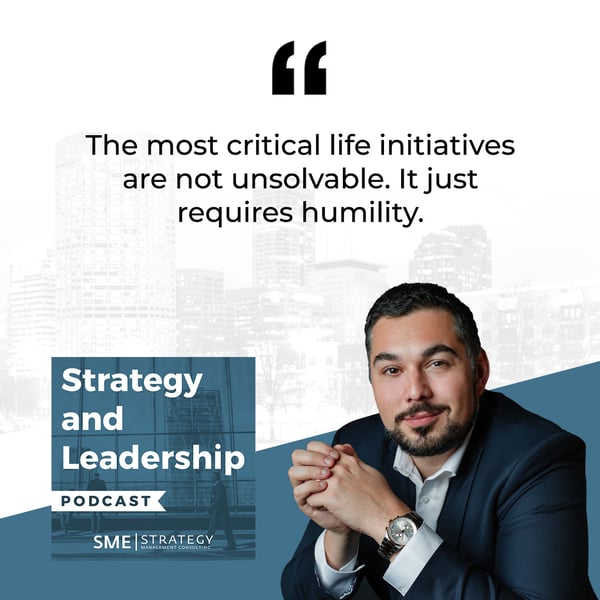
Thanks so much for having me.
My guest, Darryl Stickel, PhD, is the author of Building Trust: Exceptional Leadership in an Uncertain World. I’m taken by the fact that what is required to move those things forward, read the ten levers, practice them, stand beside your people, stand in the communities that you want to be a part of, and support by reducing uncertainty and building that trust.
Darryl, my heart is with you. I appreciate it. Hopefully, we can do that for all of our community. Take those steps, folks. Read the episode again, talk to your people, and share this with your people. Again, Darryl, I can’t thank you enough. Folks, thank you for being here, reading, and being along for the ride. I appreciate you and as always, I'll see you in the next episode.
Important Links
- Darryl Stickel
- Building Trust: Exceptional Leadership in an Uncertain World
- Darryl@TrustUnlimited.com
- Courses – Trust Unlimited
About Darryl Stickel
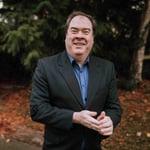
Darryl holds a PhD in Business from Duke University. He wrote his doctoral thesis on building trust in hostile environments. Upon completion of his studies Darryl worked for Mckinsey & Company in their Toronto office. Darryl founded Trust Unlimited in 2003.
Darryl has worked with senior executives from a broad range of industries from all over the world. He has served as faculty for the Luxembourg School of Business and the Center for Effective Organizations at the University of Southern California. Darryl recently completed his book Building Trust: Exceptional Leadership in an Uncertain World.
His trust model is both simple and insightful. Darryl’s practical experience and deep knowledge of trust make him a powerful thought partner and ally for individuals at the highest level of organizations. His contribution to the field of trust has been recognized by his nomination to the Top Thought Leaders on Trust by Trust Across America; Trust Around the World.


